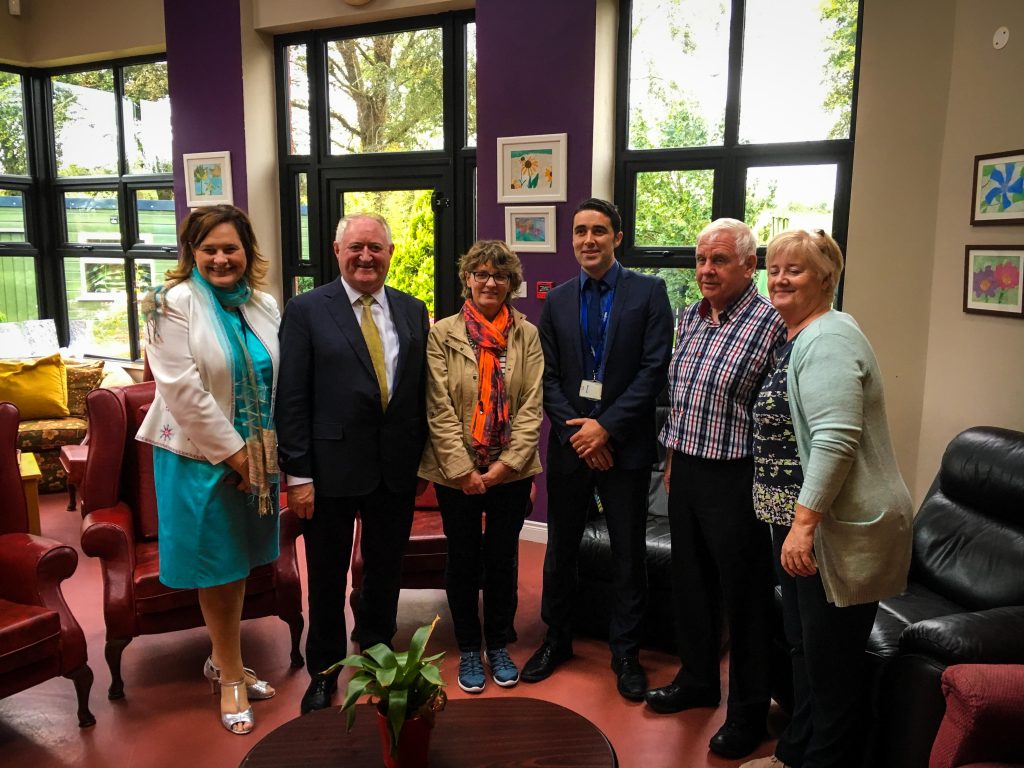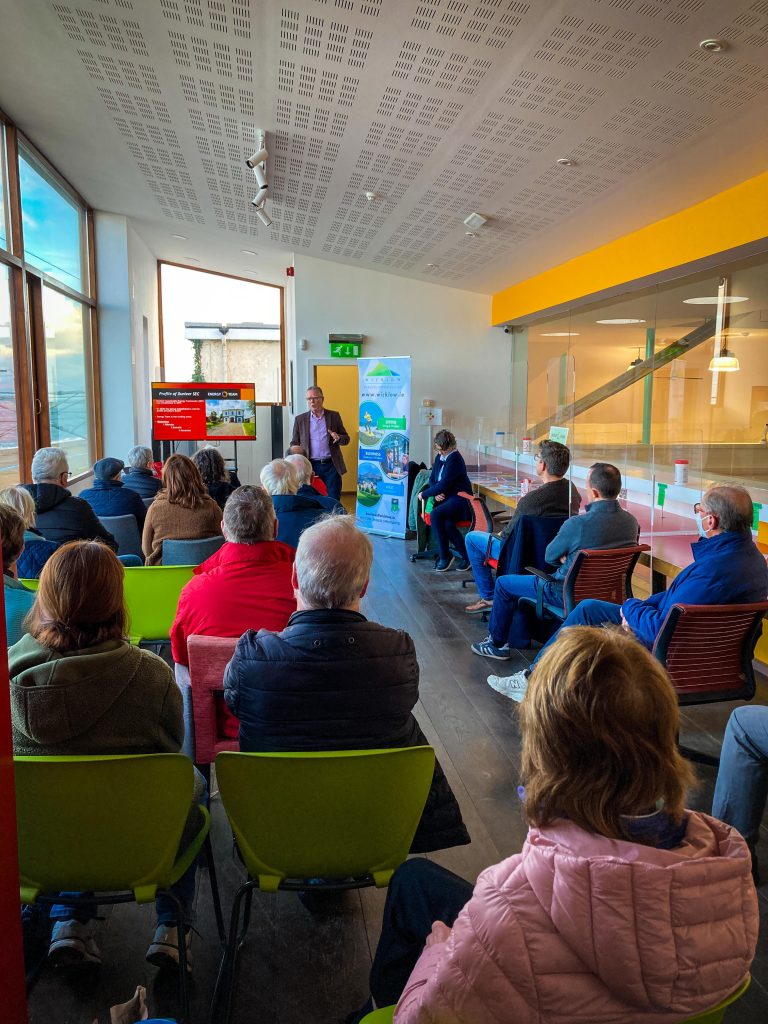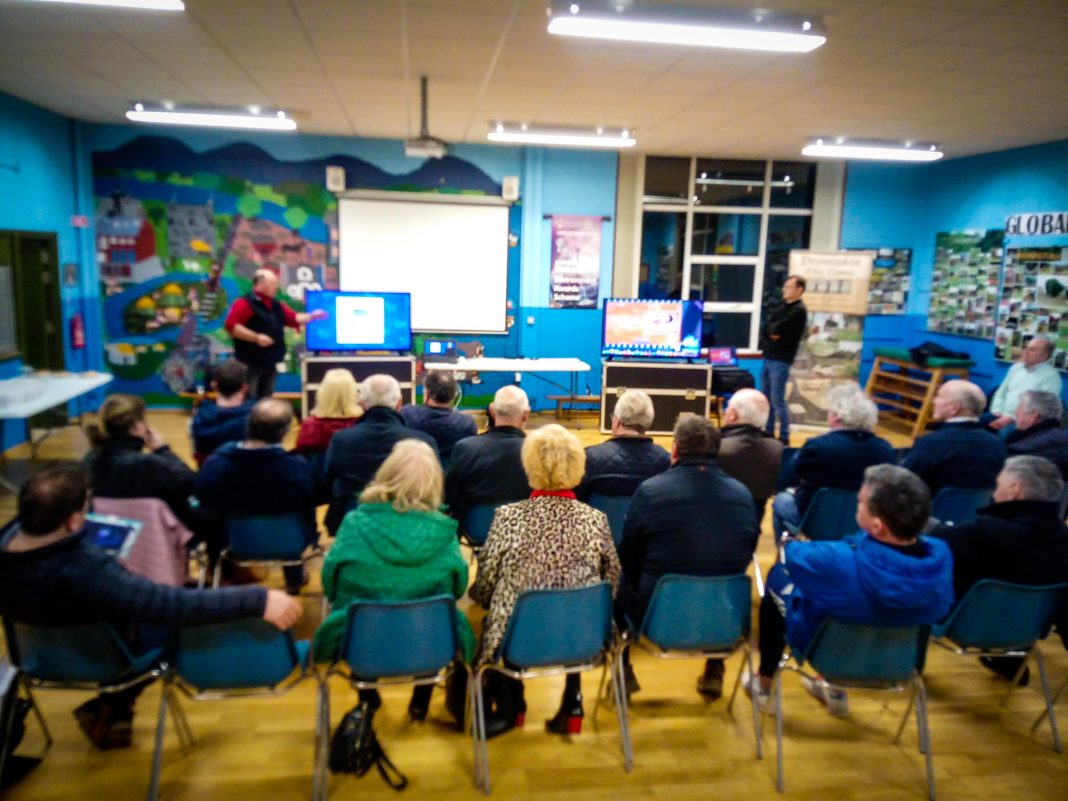Energy Team and community leaders hosting a gamified training session in Dromiskin. Image Credit: Energy Team
Big cities can learn a lot from smaller communities. Dunleer, a town in the northeast of the Republic of Ireland, has managed what many larger places have struggled to do: excite people about retrofitting. It’s proven effective in increasing rates of renovation, so we spoke to members of Energy Team to find out what other communities might learn from their experiences.
In 2019, the Building Energy Rating (BER), which assesses the energy efficiency of Ireland’s buildings found that 80% are rated at C or lower. For the uninitiated, that’s not good.
So it stands to reason that housing is the root of 10% of Ireland’s greenhouse gas emissions, while 53% of energy use in public and commercial buildings still derives from fossil fuels.
To stamp out the building sector’s role in climate breakdown, the government set out to achieve net zero with its 30-year Long-Term Renovation Strategy.
If the country realistically wants to hit these ambitious targets, says Elizabeth Kearney, the Communities Retrofit Programme Lead from Energy Team in Dunleer, it requires action at the community level.
All national plans are local.
Elizabeth Kearney
Introducing Energy Team
Dunleer, as a town of about 2,500 inhabitants, is a trailblazing example of how citizen engagement accelerates the rate of retrofitting. And it’s all down to Energy Team, the operating name of Dunleer Sustainable Energy Community (SEC).
A registered member of the Sustainable Energy Authority of Ireland’s (SEAI) SEC Network, this community group was originally formed by Dunleer Community Development Board (DCDB). Completing the picture, they partnered with a company – SE Systems – for its extensive experience in residential, community, and commercial retrofitting.
With this structure in place and expertise at hand, the challenge was getting started.
Engagement Through Gamification
“Sustainability and renewables don’t come across as the most interesting subject for most people,” admits Patrick Mulroy, Energy Team’s Projects Coordinator.
For many, even the word retrofit itself is completely foreign; some even pronounce it to rhyme with ‘profit’.
That’s why the newly formed organisation began by discussing how to disseminate information in an interesting way. Dull PowerPoint presentations in a local hall were not going to cut it. To get people listening, engagement had to be fun.
Bringing together locals with a shared interest but diverse skills – a teacher, an engineer, software developers, and a renewables practitioner among them – the team created an interactive TV show-style game. It was a game-changer (excuse the pun).
Suitable Language
Facilitated at public meetings by community leaders and an energy expert from the Dundalk Institute of Technology, the game is fun and frenetic.
Played on tablets, it is complete with multiple choice questions, comic avatars, animations, and a big screen to capture it all. They even award prizes for the winner – crowned the ‘Energy Ambassador’.
Much like our glossary, this educates retrofitting concepts by removing the overwhelming scientific jargon.
The hosts tell a narrative avoiding existential climate emergencies like the melting ice caps, instead “breaking down the basics of energy, and how [residents] could consider renewable energy in their life”, Patrick tells us.
They explain, for example, how much appliances consume and how to understand energy bills – in Ireland, the reverse side breaks down the KWh units. Few people seem to read this.
When it’s over, anyone interested in retrofitting completes a (non-committal) expression of interest. At some meetings, as many as 50% of attendees sign up.
Making Retrofits Accessible
Gamifying awareness and education is only the first step. Early on, Energy Team realised that converting interest into actual energy retrofits required a simplified process that didn’t alienate homeowners.
The concept is now a priority stated in the National Climate Plan, but when Energy Team developed a one-stop-shop of services, it was fairly original. This is where they:
- Translate essential terminology and communicates processes.
- Arrange BER technical assessments for interested households, from which they determine what each property requires: insulation, a heat pump, solar panels, etc.
- Provide details of costing and advise on applicable grants offered by the Sustainable Energy Authority of Ireland.
- Broker partnerships between the community, academia, businesses, and local government – known as the quadruple helix – to secure a reliable workforce for the entire retrofitting process.
- Schedule the work with trusted SEAI approved contractors.
- Assist with the admin – each project includes up to 40 forms, funding applications, and technical paperwork!
Left to sort this out themselves, many homeowners would understandably balk at the extent and complexity of what’s involved. That’s not an issue in Dunleer.
A Story of Success
By 2021, Energy Team had facilitated the retrofit and transition from fossil to renewable fuels of 310 residential properties plus additional public buildings, community halls, and sports clubs.
The upgraded floodlighting for a Gaelic Athletic Association pitch is a nationally recognised triumph, while one dementia day care centre was so impressed by a retrofit done in 2019, Energy Team have been invited back to add a heat recovery system.

The successes of the group were recognised when Energy Team received the Most Inspiring Sustainable Energy Community award in 2020.
Witnessing first-hand the community assets improve is seen to increase interest further. Examples act as a powerful promotional and information tool.
Even Elizabeth, now an advocate of retrofitting, was initially unfamiliar with the technology. She learnt a lot by visiting the sites.
I would certainly advise anyone who was beginning the process to go out to where the work is being done and see the process.
Elizabeth Kearney
Recognising the Value of Retrofitting
People often base their decision to retrofit on whether the cost savings cover the initial expenses. Not in Dunleer.
Gamified sessions present the full value of retrofitting: the comfort and convenience it offers. This shifts expectations.
Aside from warmer homes, residents “were no longer having to arrange for oil to be delivered”, Patrick explains, or “going out on a winter night to get their coal or wood in”.
“That means as much to them as any money they might save.”
Generally, Elizabeth adds, residents need to be assured of how little disruption the retrofitting work causes to sustain their interest.
In some cases, the result is exponential: the retrofit seems to empower and energise residents to instigate further aesthetic improvements, like repairing garden walls or repainting rooms. Attitudes and ramshackle properties are completely transformed.
Room for Improvement
It’s not all plain sailing, of course.
Ireland has set an overall target of 1.5 million retrofits by 2050. However, only “around 2,000 homes were upgraded via government schemes” in 2019.
Rolling out initiatives such as Energy Team’s to hit these targets is a major challenge, Elizabeth tells us, because of the myriad processes involved: funding, buy-in from residents, technical teams, and “even the importation of materials” all need to be scaled up.
She cites there is “willingness” from stakeholders in getting this done, yet recognises the challenge ahead, even with governments driving the transition.
Essential Local Action
Ireland established a national Retrofit Taskforce, setting its sights on completing 500,000 retrofits already by 2030, but, as Elizabeth is quick to mention, “the plan will stay on the page unless you get community buy-in”.
A move in the right direction: the SEAI makes clear on its website the excellent grants on offer.
Even so, the effort needed to follow this up alone, and the terms involved, are sometimes too much for many.
This is where Energy Team’s one-stop-shop approach excels. Residents can drop by and speak to a member of the team who can translating terminology and offer assistance from start to finish. “We hand-hold them through that process”, Elizabeth confirms.
The role of Sustainable Energy Communities is often vital to retrofit completion.
So much so, that in 2022, Local Authorities in a number of counties approached Energy Team to share knowledge on engaging homeowners with their local SECs so that they too may replicate what the Dunleer group has accomplished.

Limitations
Unfortunately, it’s not possible to follow through with retrofits for every homeowner who contacts the Energy Team.
The Building Energy Rating technical assessment can identify structural constraints which disqualify a home from participating in the community scheme.
In other words, the improvements wouldn’t deliver efficiencies that meet required standards. (We know from other cases, for example, that retrofits which restrict airflow can lead to damp and mould. This is to be avoided.)
But Energy Team doesn’t wash their hands of these enquiries. When people are hooked, it’s important to reel them in! To this end, the Energy Team can advise these homeowners about grants and other opportunities made available through the SEAI. No chance is wasted.
Learning for Other Cities
It’s a long road ahead, but there are many lessons to be learned from Energy Team’s experiences, which will light the way for other communities.
Whatever we need to learn may not necessarily be in our local area and indeed may not be in the country.
Elizabeth Kearney
People find the game fun and informative but for those who need more convincing, Energy Team operates an open-door policy where interested parties can call or drop in with their questions.
The trust this face-to-face support builds is an advantage of working at a local level – it is not inherent in a hierarchical system.
Dunleer’s model of personal interaction and engagement are such examples of good practice that they were invited to share learnings with Alheim, in Germany. In return, they took back to Ireland Alheim’s knowledge on community energy generation – a project planned for later – and a local financing model; this has prompted closer engagement between Energy Team and credit unions in the county, who now accept confirmation of a retrofitting grant as a basis for a loan to fund the rest of the renovation.
The Next Generation
Dunleer and Alheim continue to meet regularly online to share their findings.
This relationship has been so successful that in April 2022, the German ambassador to Ireland visited the Energy Team office in Dunleer to learn more about the team’s activities. We sense potential for this initiative to scale up even further.
And once again Energy Team are innovating their forms of engagement.
In 2023, they plan to take an exhibition around local schools. This will explain to young people the ideas behind not only home energy retrofits, but also wind energy, carbon sequestration, biodiversity, and water quality, all building blocks of sustainable living.
It’s hoped that this will stimulate students’ interest in these fields, show them that groups such as the Energy Team are actively engaged, and possibly even set them on the path to careers in green industries.
That may be the most significant lesson of all: communities need to act while there is enthusiasm for it.
Given its ability to generate this in droves, we wonder how long it will be until Energy Team’s one-stop-shop system is a common fixture in other urban neighbourhoods throughout the country… and beyond.


